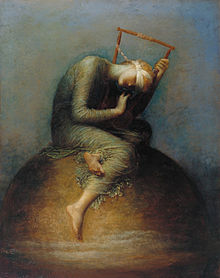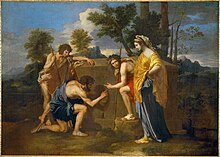Theocritus
Appearance


Theocritus (fl. c. 270 BC) was a Greek poet of the 3rd century BC, probably a Syracusan who later lived in Kos and Alexandria. He invented the genre of pastoral poetry.
| This article on an author is a stub. You can help out with Wikiquote by expanding it! |
Quotes
[edit]
Was the gift, and yet how precious! Friendship's gifts are priceless all.
Idylls
[edit]- ἠνίδε σιγῇ μὲν πόντος, σιγῶντι δ᾽ ἀῆται
ἁ δ᾽ ἐμὰ οὐ σιγῇ στέρνων ἔντοσθεν ἀνία- Look, still is the sea and still are the breezes; but the pain in my heart is not still.
- Idyll 2, lines 38-39
- Look, still is the sea and still are the breezes; but the pain in my heart is not still.
- τάχ᾽ αὔριον ἔσσετ᾽ ἄμεινον ἐλπίδες ἐν ζωοῖσιν, ἀνέλπιστοι δὲ θανόντες
- While there's life there’s hope, and only the dead have none.
- Idyll 4, line 42; translation by A. S. F. Gow, from Theocritus ([1950] 1952) vol. 1, p. 37.
- Compare Cicero (1st century BC), Epistolarum ad Atticum [Epistle To Atticus], Book IX, 10, 4: Ægroto, dum anima est, spes est [While the sick man has life, there is hope.]
- Faults are beauties, when survey'd by love.
- Idyll 6, line 19; translation by Richard Polwhele, from The Idyllia, Epigrams, and Fragments, of Theocritus, Bion, and Moschus, with the Elegies of Tyrtæus (1810) p. 36.
- Milk the ewe that thou hast, why pursue the thing that shuns thee?
- Idyll 11, line 75; translation by Andrew Lang, from Theocritus, Bion and Moschus Rendered into English Prose ([1880] 1901) p. 63.
- ἐς Τροίαν πειρώμενοι ἦνθον ᾿Αχαιοί,
καλλίστα παίδων: πείρᾳ θην πάντα τελεῖται.- The Greeks got into Troy by trying, my pretties; everything's done by trying.
- Idyll 15, line 61; translation by A. S. F. Gow, from Theocritus ([1950] 1952) vol. 1, p. 113.
- The Greeks got into Troy by trying, my pretties; everything's done by trying.
- The godly seed fares well: the wicked's is accurst.
- Idyll 26, line 36; translation by C. S. Calverley, from Theocritus, translated into English Verse.
- Men shall look on thee and murmur to each other, "Lo! how small
Was the gift, and yet how precious! Friendship's gifts are priceless all."- Idyll 28; lines 21-22; translation by C. S. Calverley, from Theocritus, translated into English Verse.
- Reflect, ere you spurn me, that youth at his sides
Wears wings; and once gone, all pursuit he derides.- Idyll 29; lines 27-28; translation by C. S. Calverley, from Theocritus, translated into English Verse.
Quotes about Theocritus
[edit]
- Theocritus [is] another bright instance of the happy abilities and various accomplishments of the ancients. He has written in several sorts of poetry, and succeeded in them all. It seems unnecessary to praise the native simplicity and easy freedom of his pastorals, when Virgil himself sometimes invokes the muse of Syracuse; when he imitates him through all his own poems of that kind, and in several passages translates him... In several of his other poems he shows such strength of reason and politeness, that would qualify him to plead among the orators, and make him acceptable in the courts of princes.
- Anthony Blackwall, An Introduction to the Classics (1718).
- That which distinguishes Theocritus from all other Poets, both Greek and Latin, and which raises him even above Virgil in his Eclogues, is the inimitable tenderness of his passions, and the natural expression of them in words so becoming of a Pastoral.
- John Dryden, Preface to Sylvae (1685)
- The Idylliums of Theocritus have something so inimitably sweet in the verse and thoughts, such a native simplicity, and are so genuine, so natural a result of the rural life, that I must, in my poor judgment, allow him the honour of the pastoral.
- Henry Felton, A Dissertation on Reading the Classics, And Forming a Just Style (1709).
- Quin etiam ritus pastorum et Pana sonantem
In calamos Sicula memorat tellure creatus,
Nec silvis silvestre canit perque horrida motus
Rura serit dulcis Musamque inducit in aulas.- The sweet Theocritus, with softest strains,
Makes piping Pan delight Sicilian swains;
Through his smooth reed no rustic numbers move,
But all is tenderness, and all is love;
As if the Muses sat in every vale,
Inspir'd the song, and told the melting tale. - Marcus Manilius, Astronomica, Book II, lines 39–42 (tr. Thomas Creech).
- The sweet Theocritus, with softest strains,
- Theocritus excels all others in nature and simplicity. The subjects of his Idyllia are purely pastoral... But it is enough that all others [pastoral writers] learned their excellence from him, and that his dialect alone has a secret charm in it, which no other could ever attain.
- Alexander Pope, A Discourse on Pastoral Poetry (1717).
- There are few images and sentiments in the Eclogues of Virgil, but what are drawn from the Idylliums of Theocritus: in whom there is a rural, romantic wildness of thought, heightened by the Doric dialect; with such lively pictures of the passions, and of simple unadorned nature, as are infinitely pleasing to such lovers and judges of true poetry as yourself. Theocritus is indeed the great store-house of pastoral description, and every succeeding painter of rural beauty (except Thomson in his Seasons) hath copied his images from him, without ever looking abroad upon the face of nature themselves.
- Joseph Warton, Prefatory Dedication of The Works of Virgil to Lord Lyttelton (1753).
- If I might now venture to speak of the merits of the several pastoral writers, I would say, that in Theocritus we are charmed with a certain sweetness, a romantic rusticity and wildness, heightened by the Doric dialect, that are almost inimitable... Several of his pieces indicate a genius of a higher class, far superior to pastoral, and equal to the sublimest species of poetry.
- Joseph Warton, A Dissertation upon Pastoral Poetry (1753).

